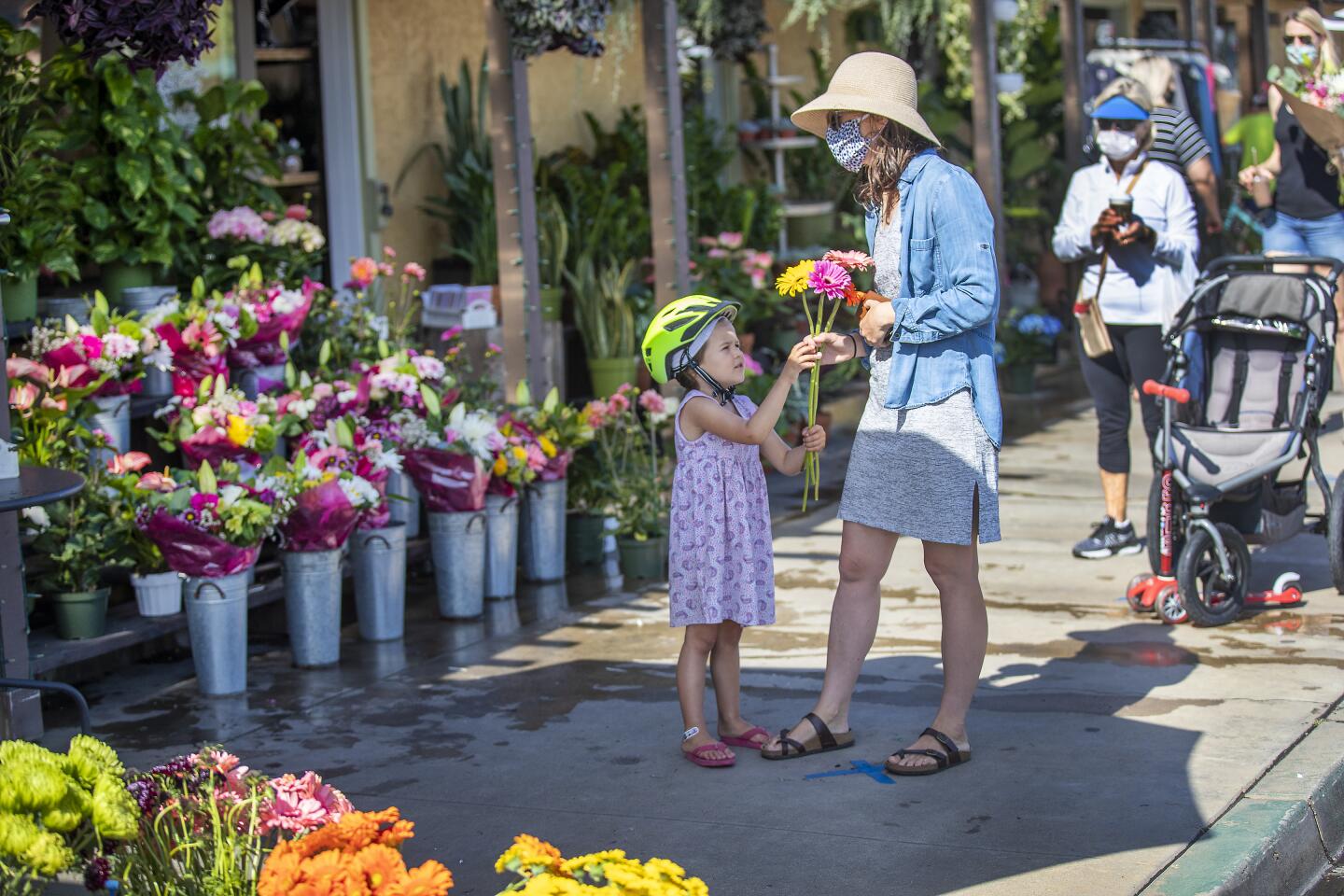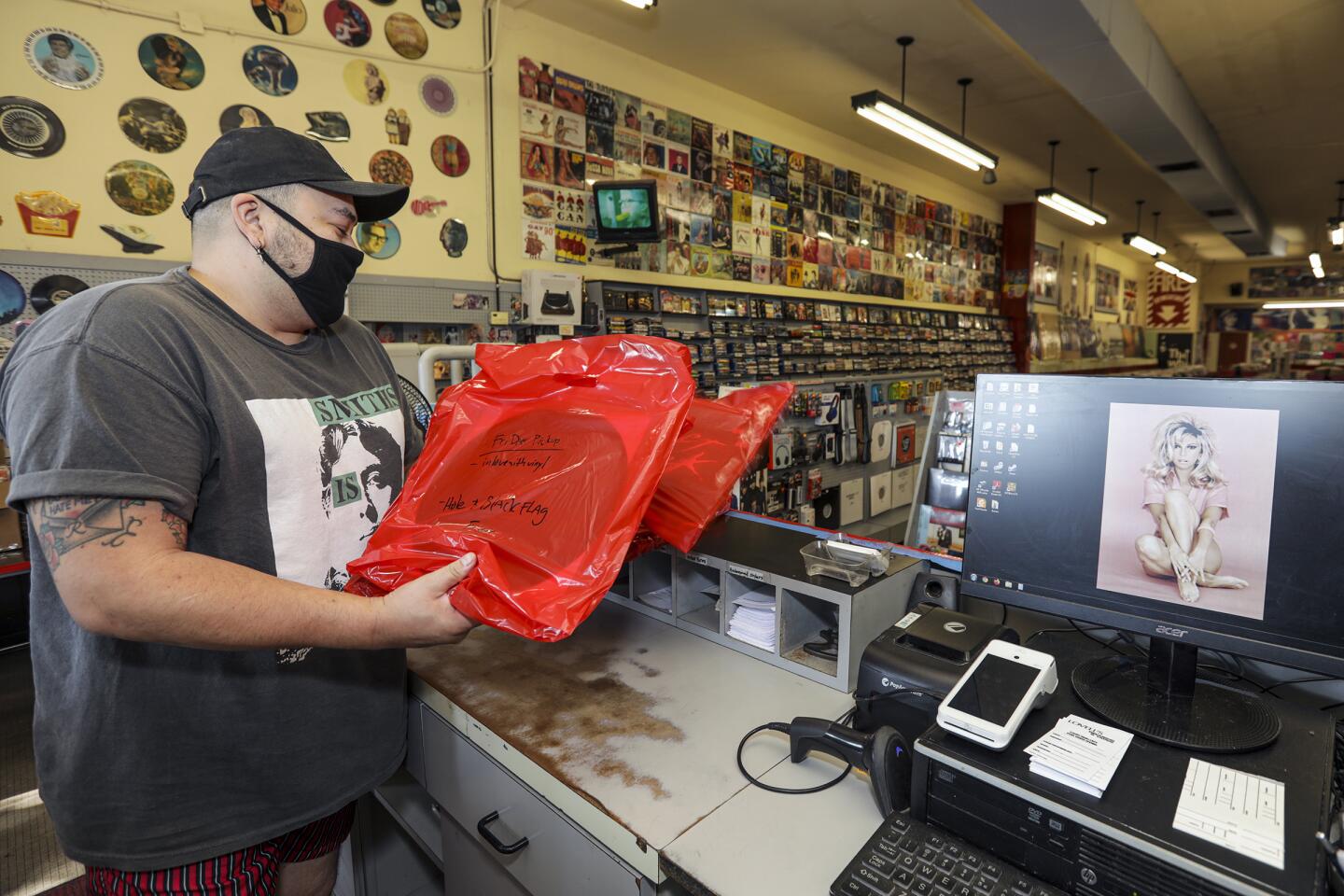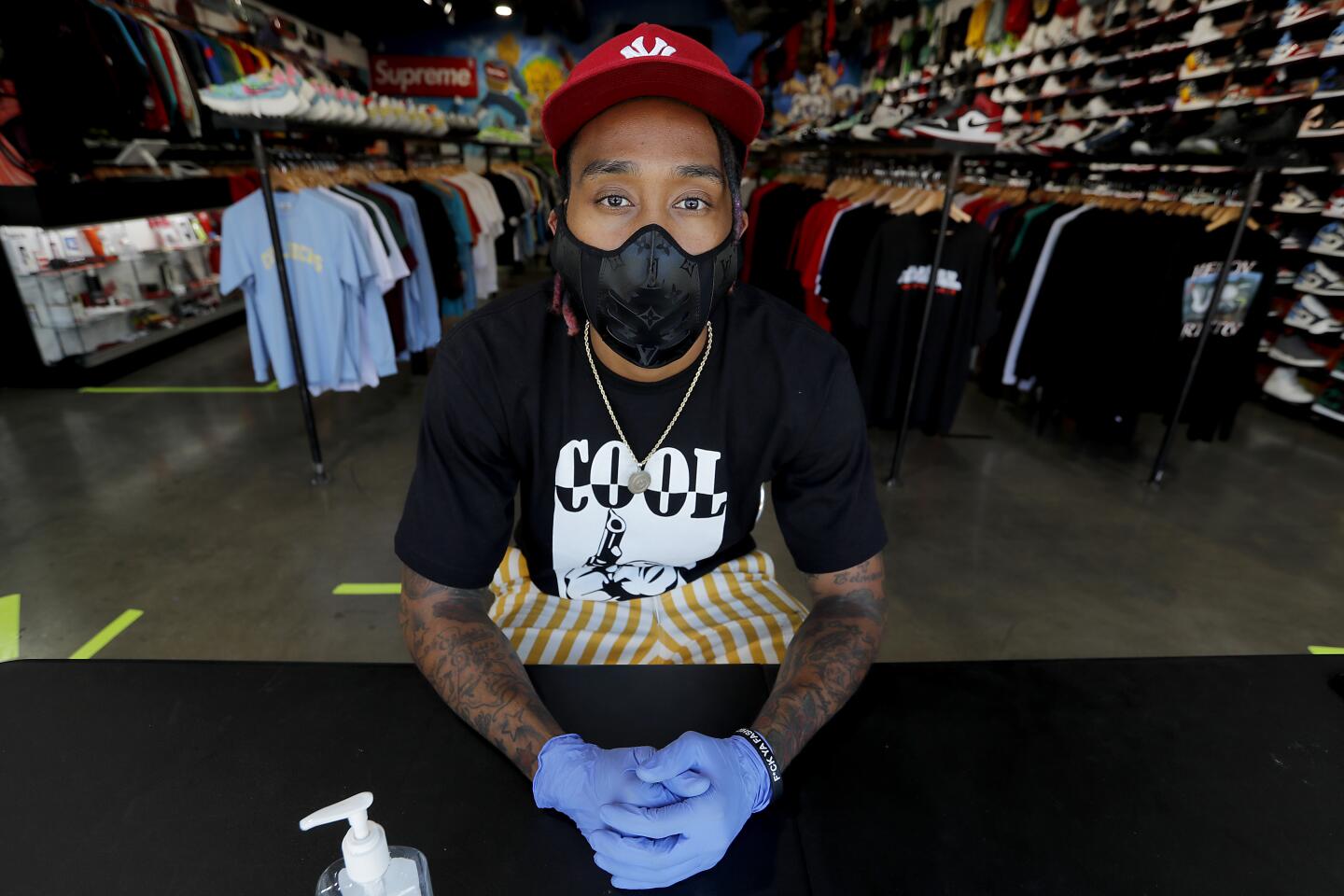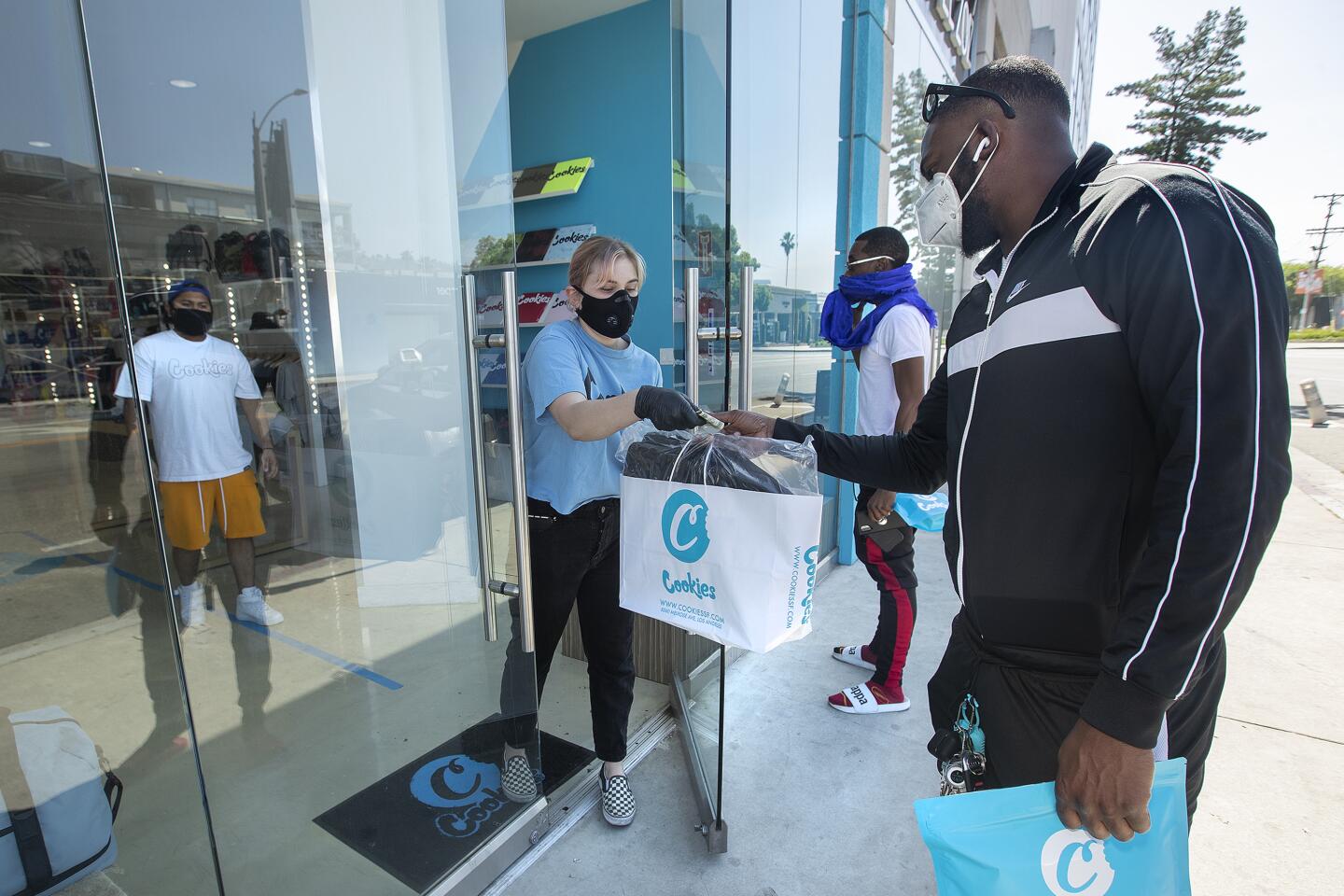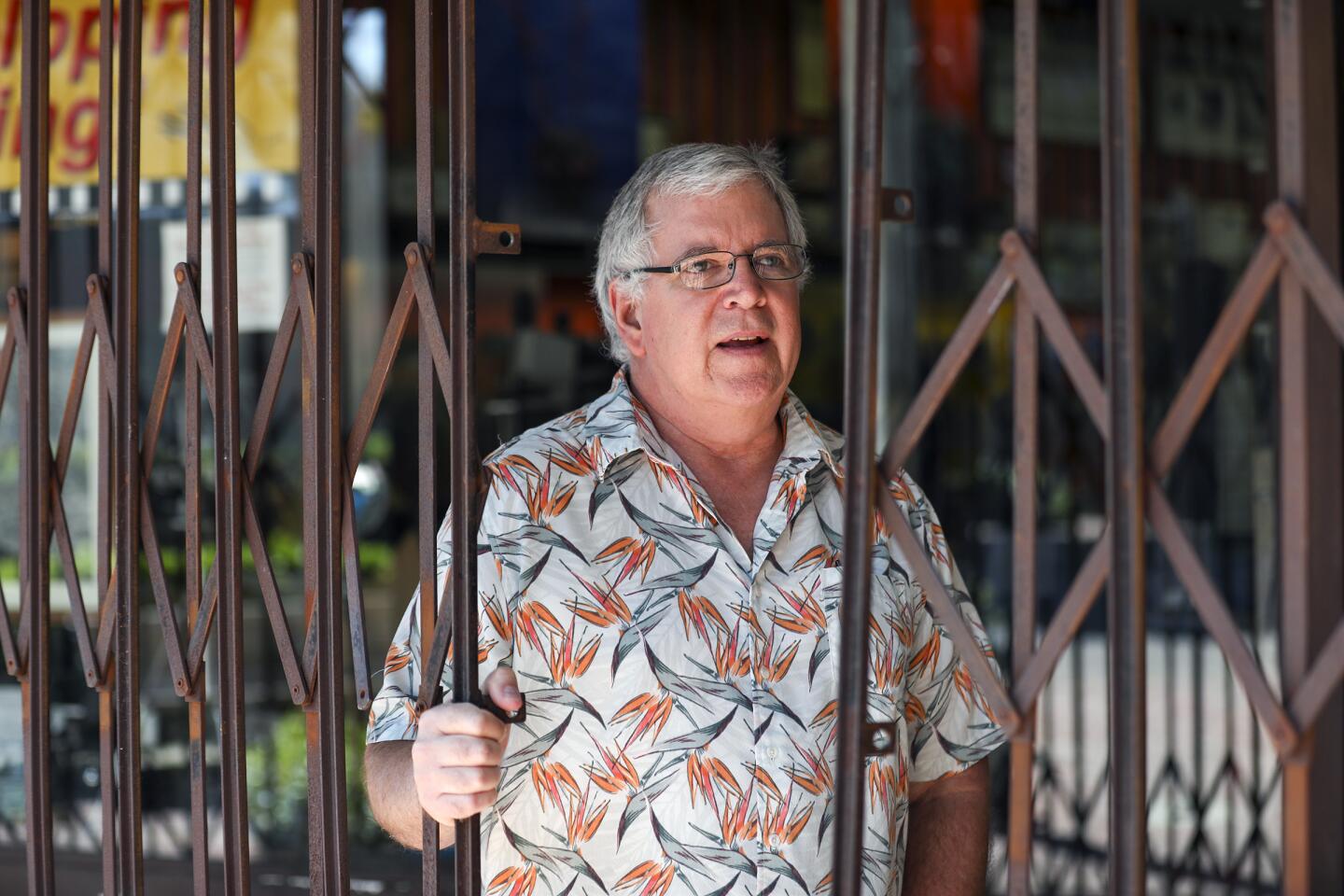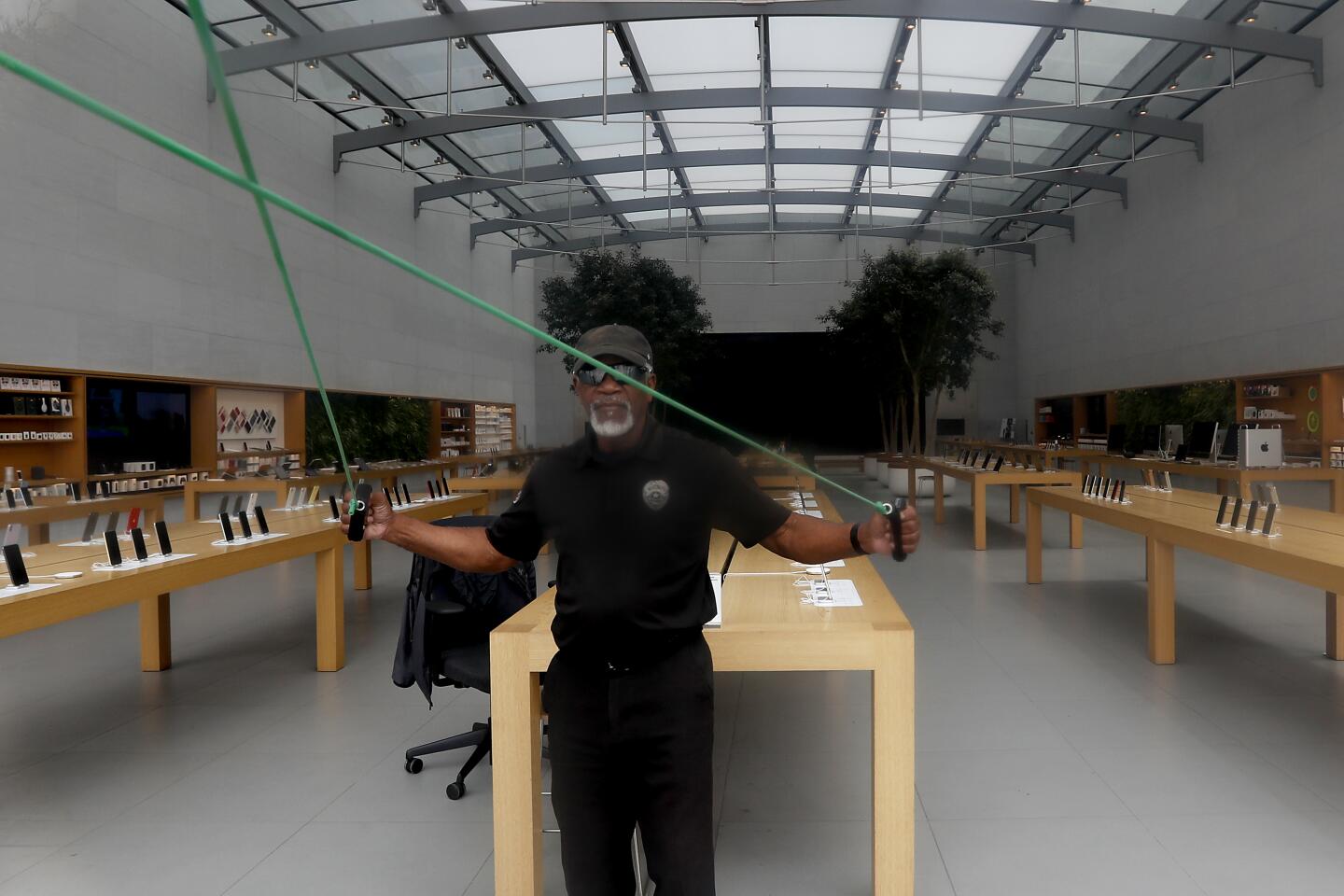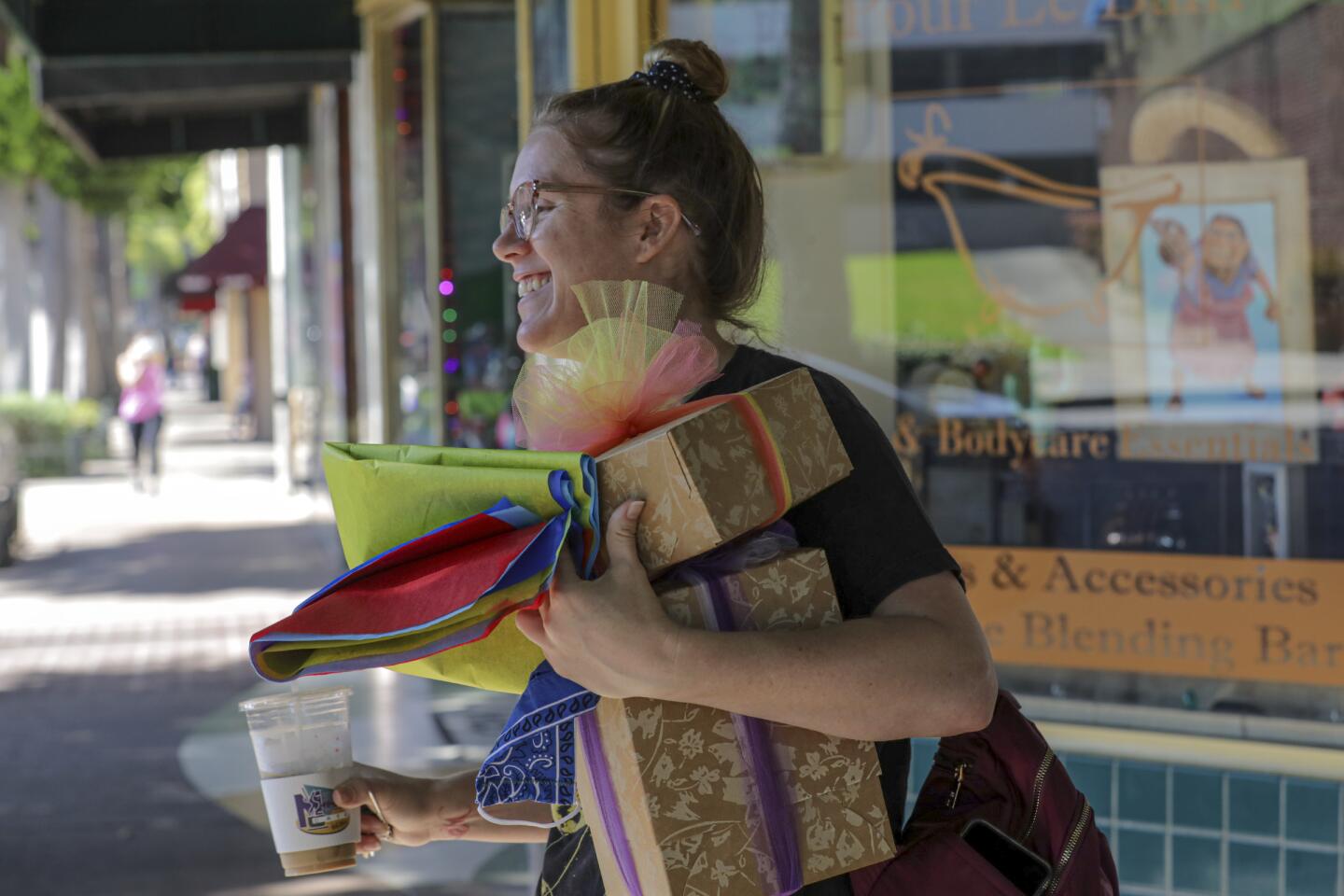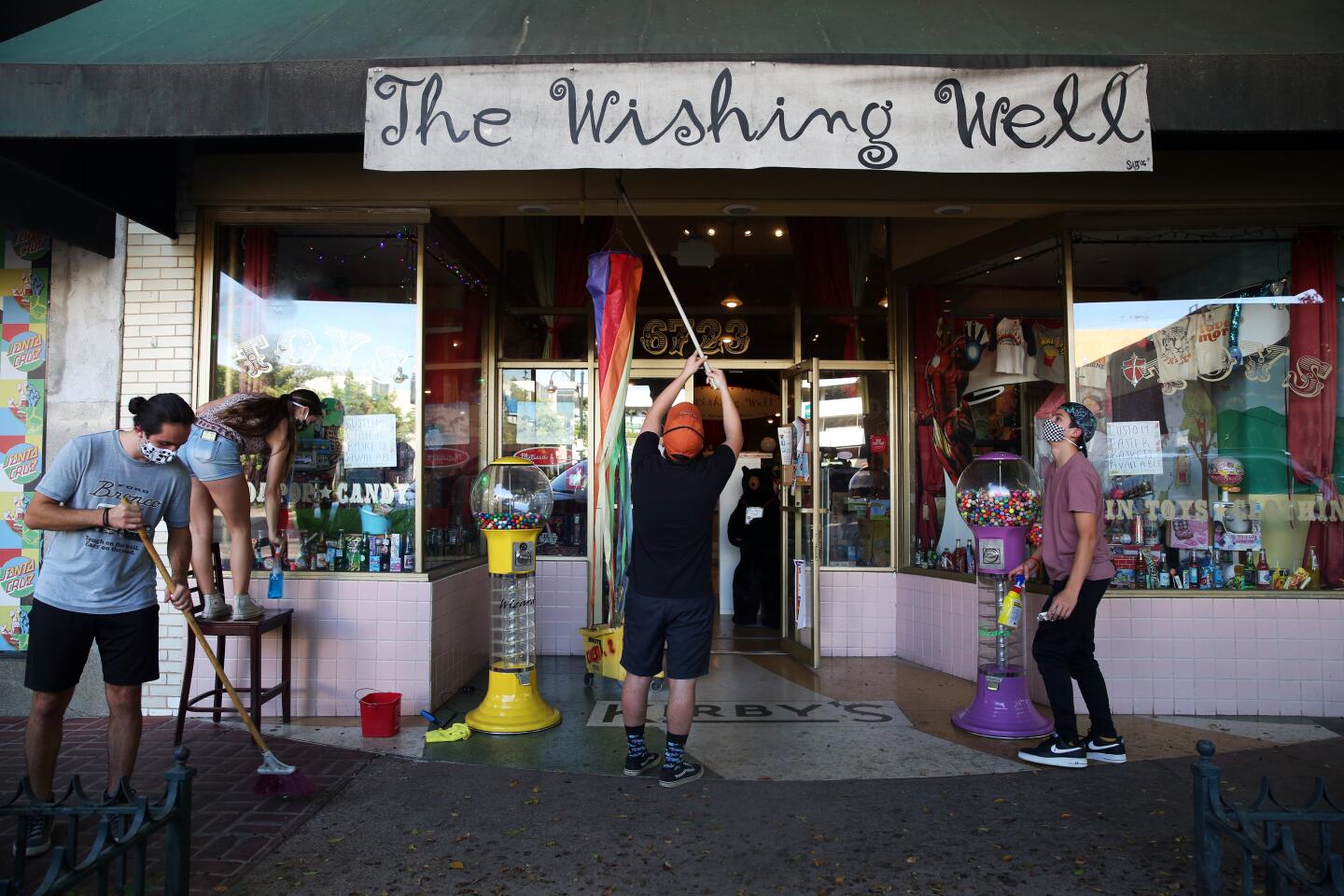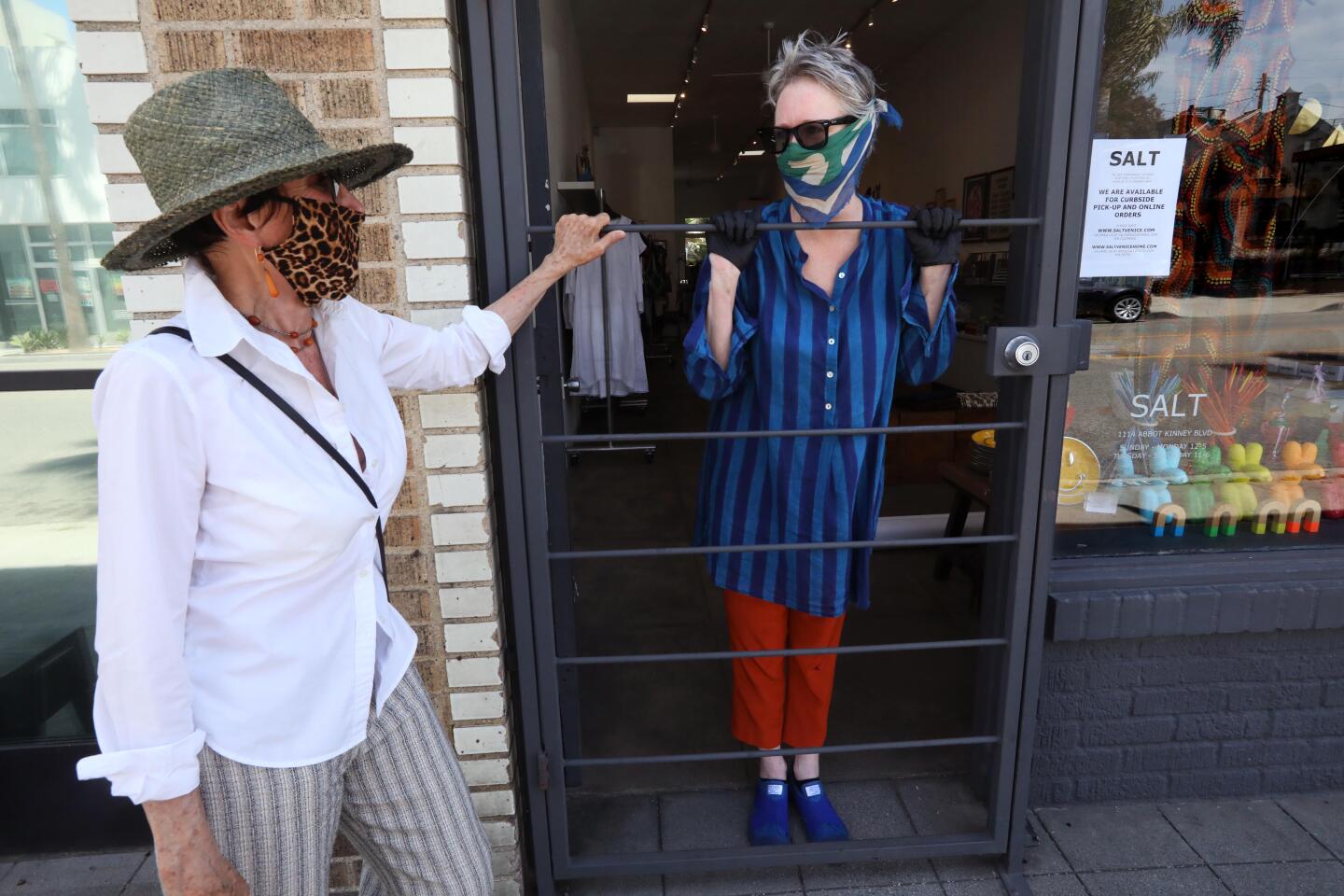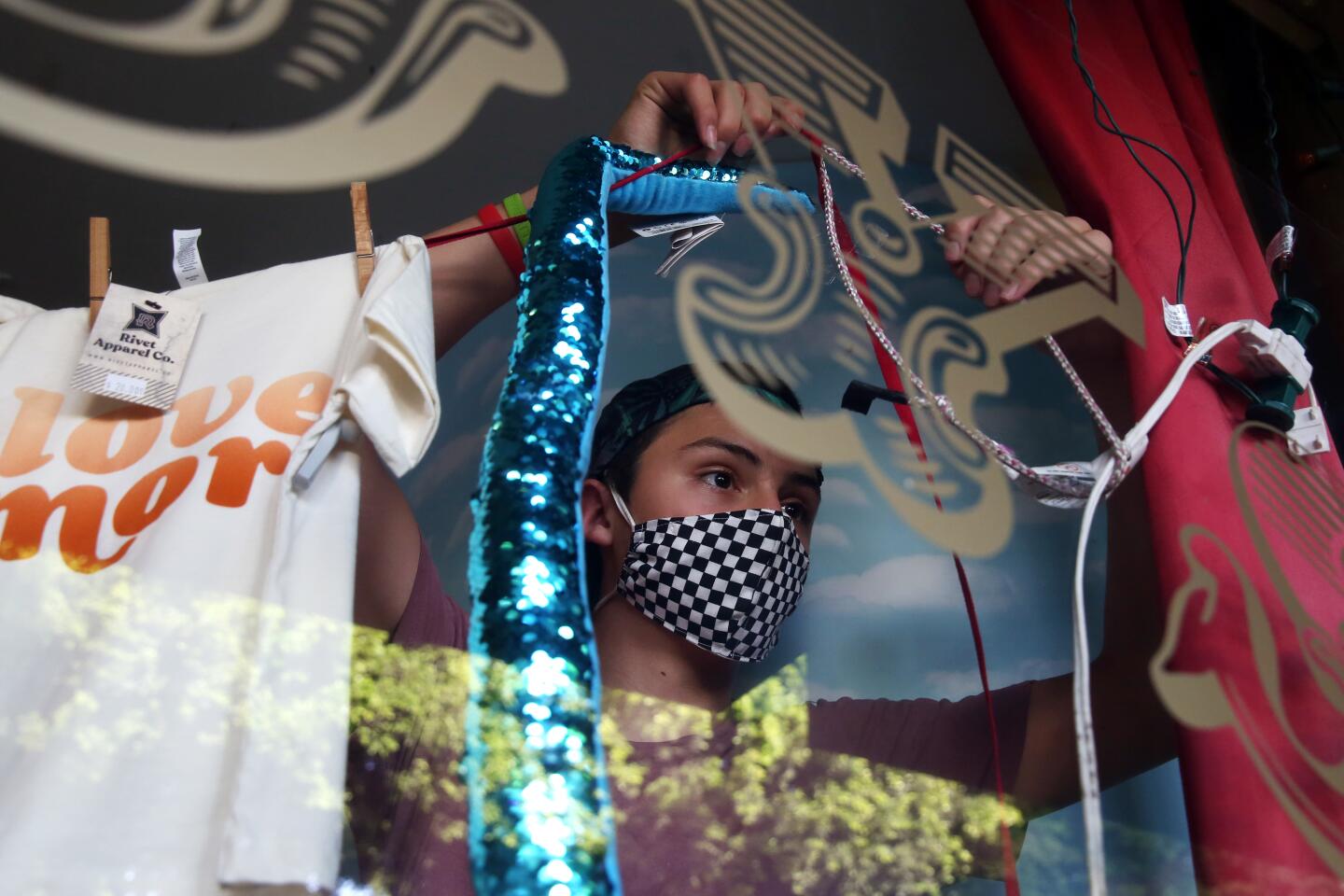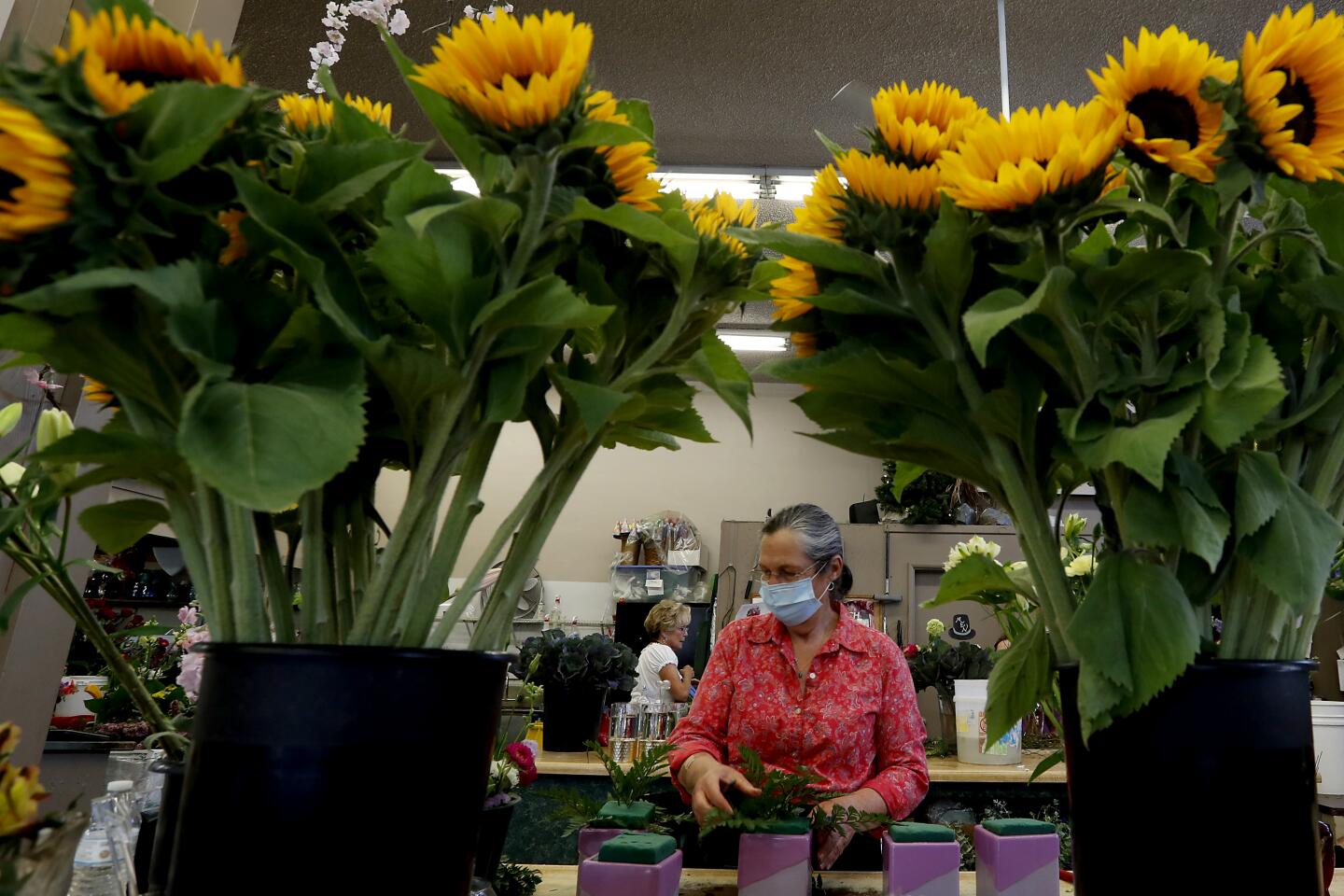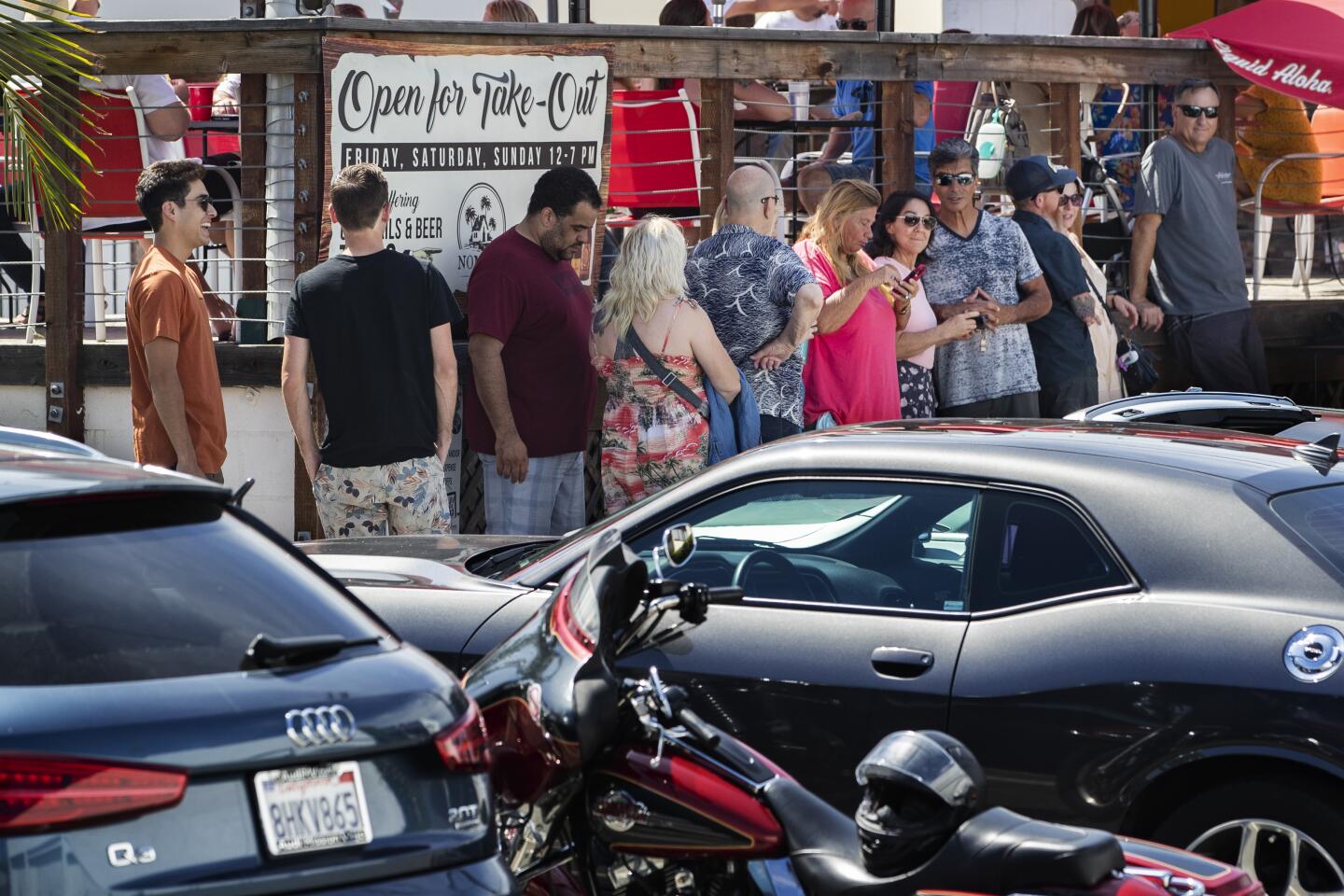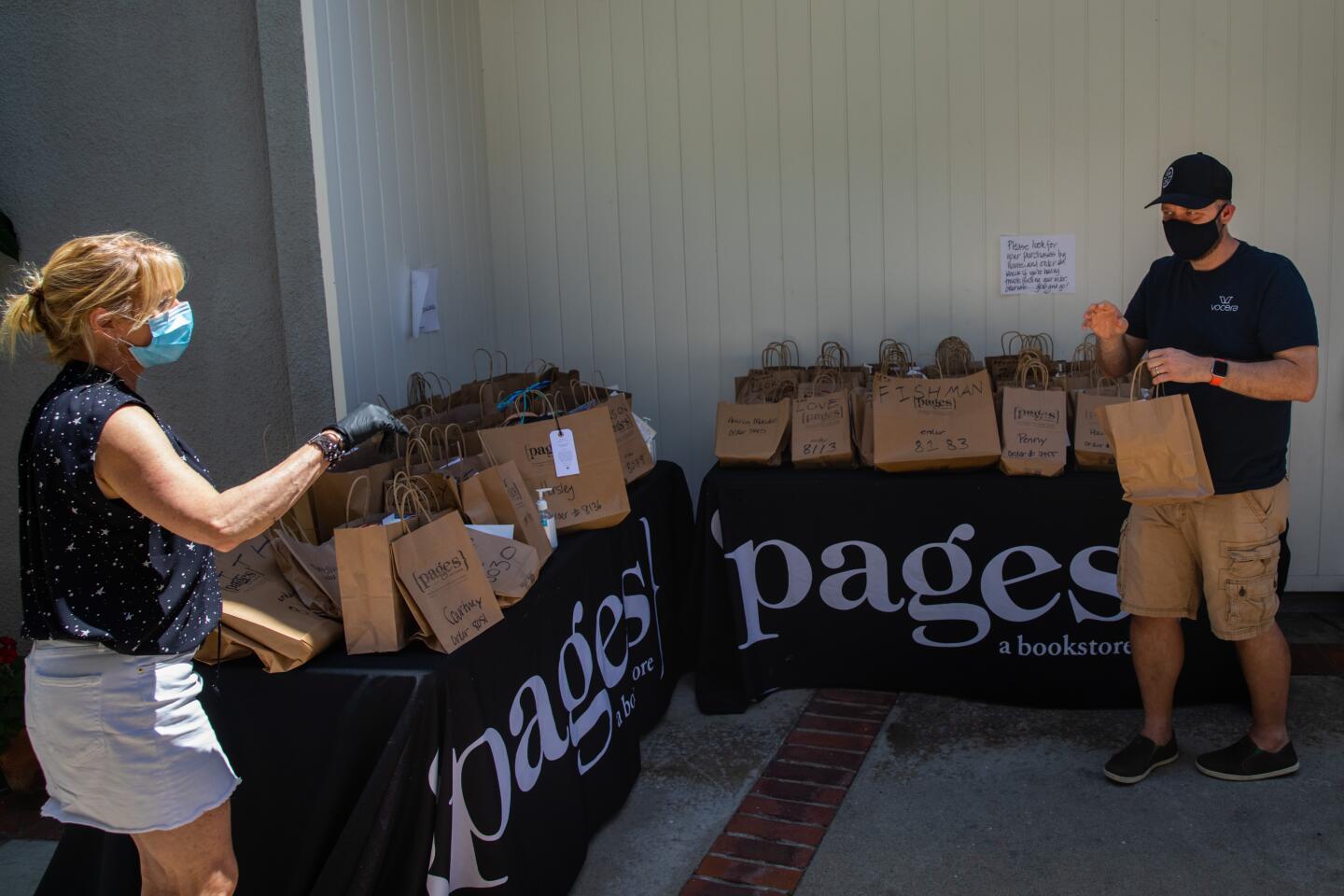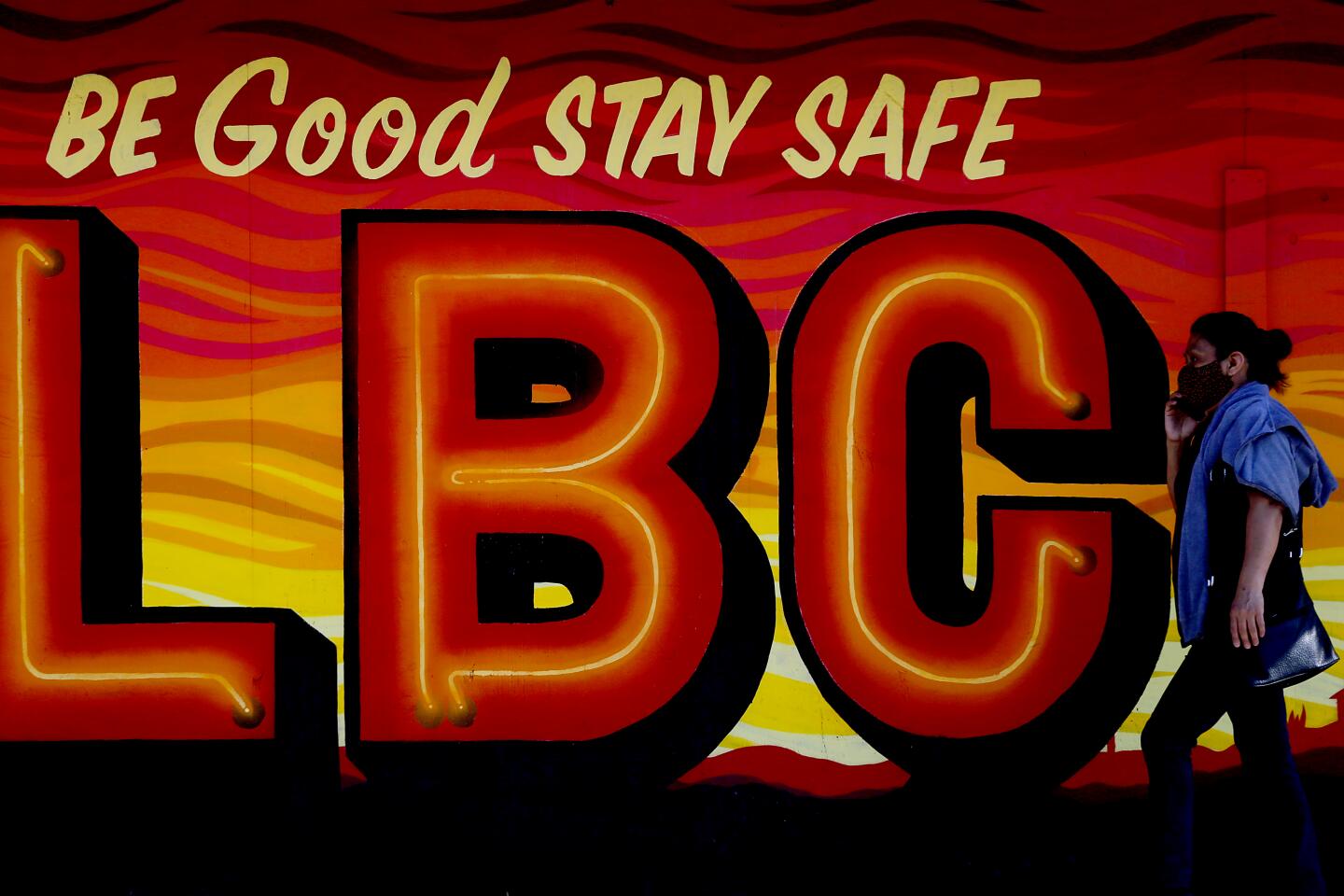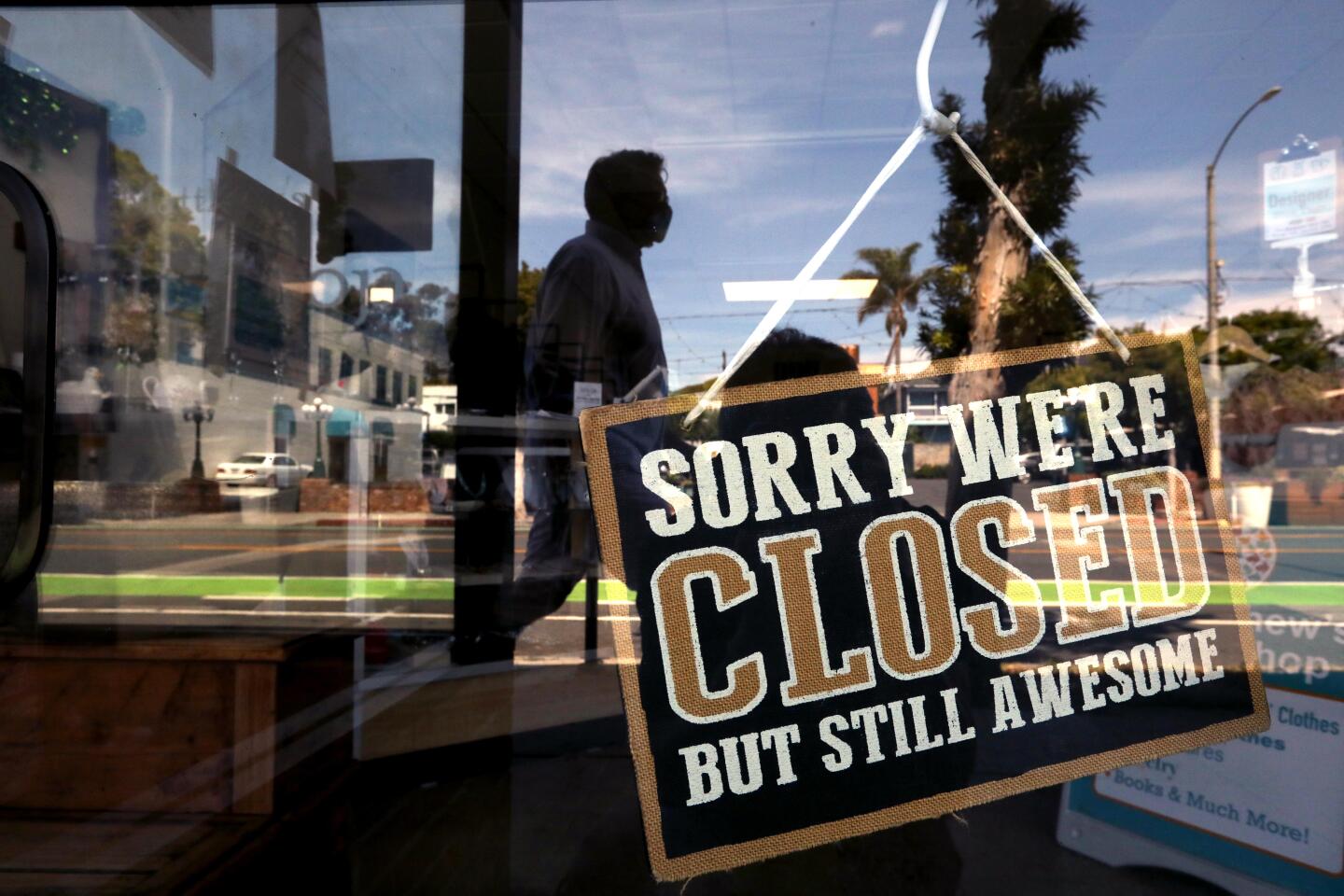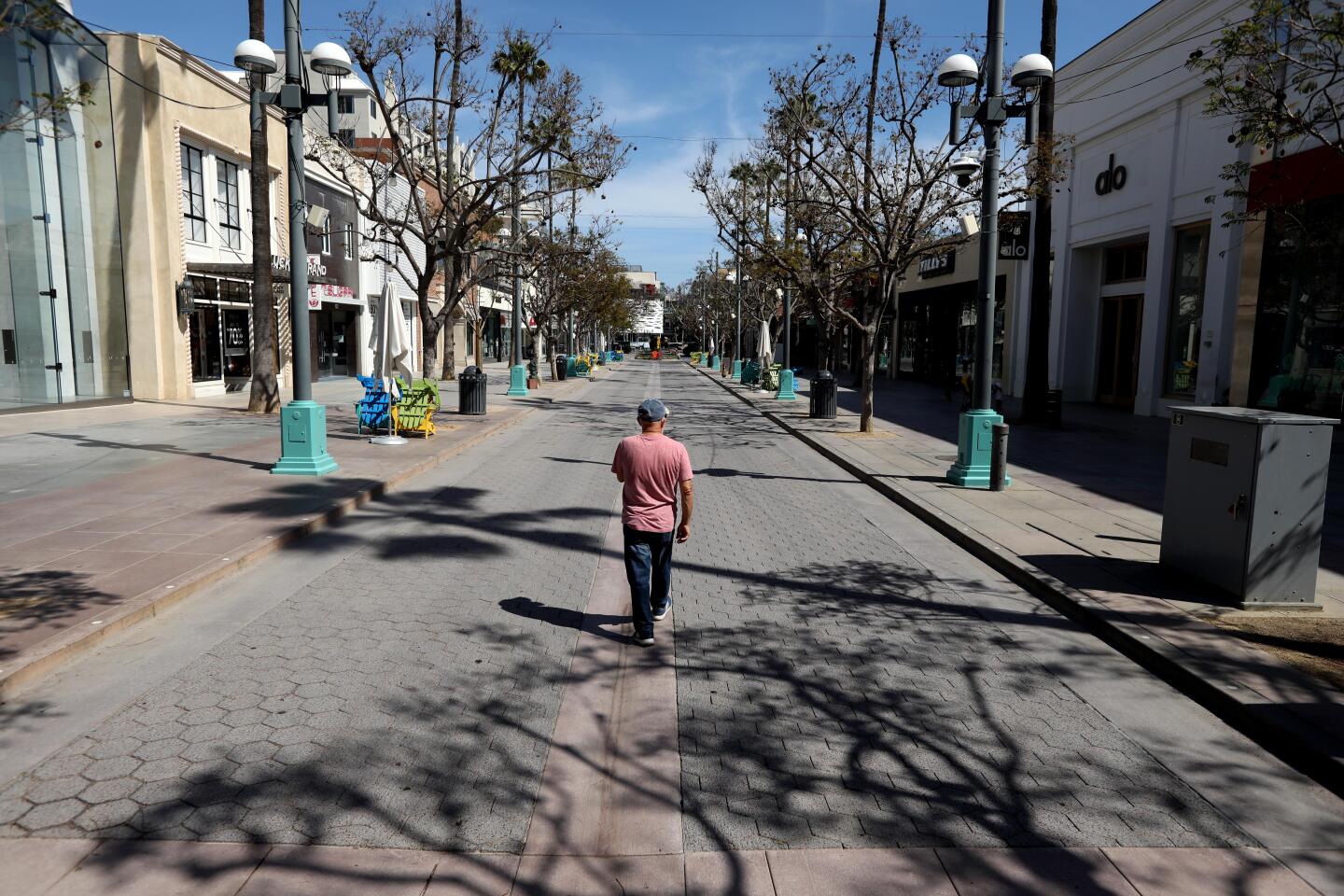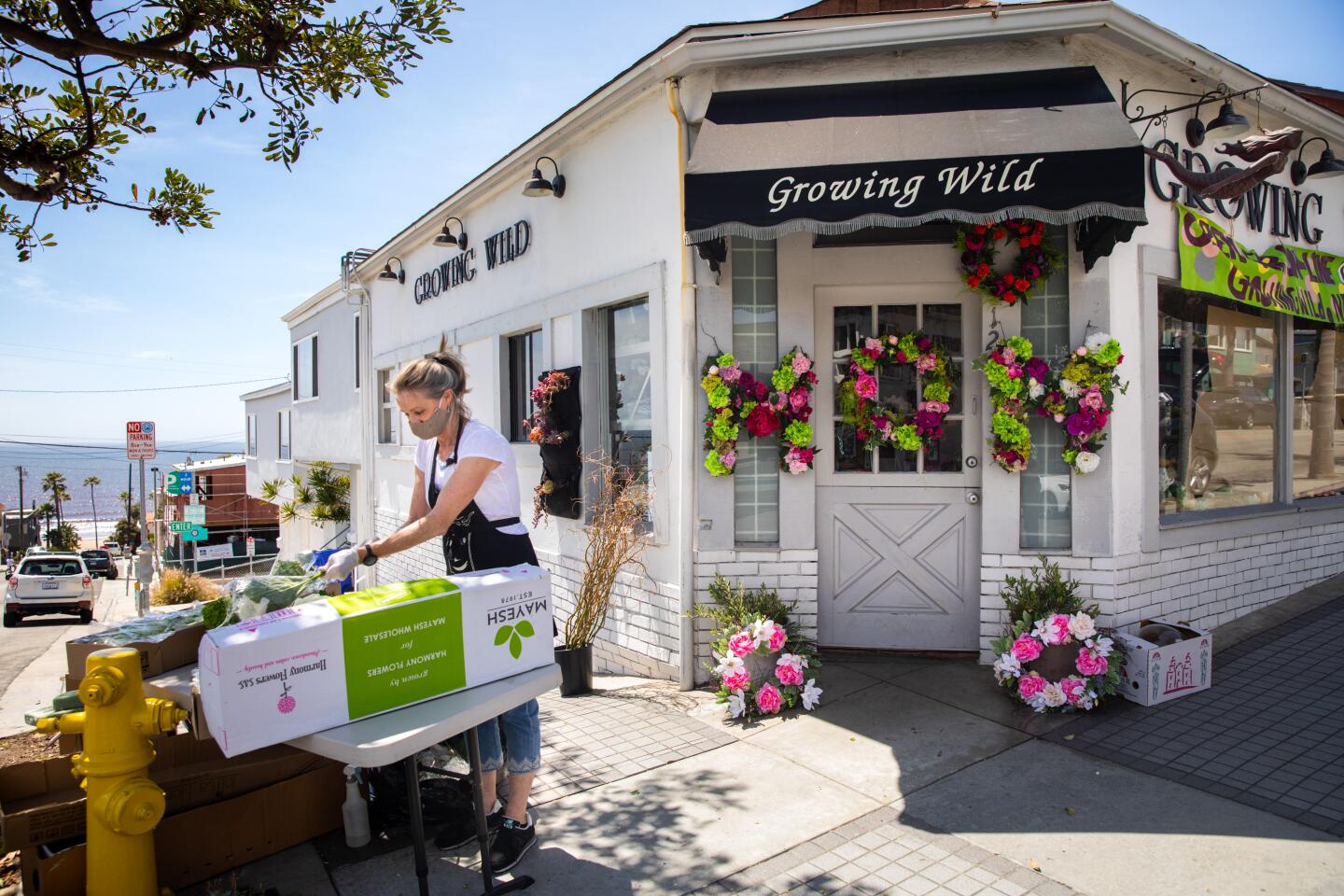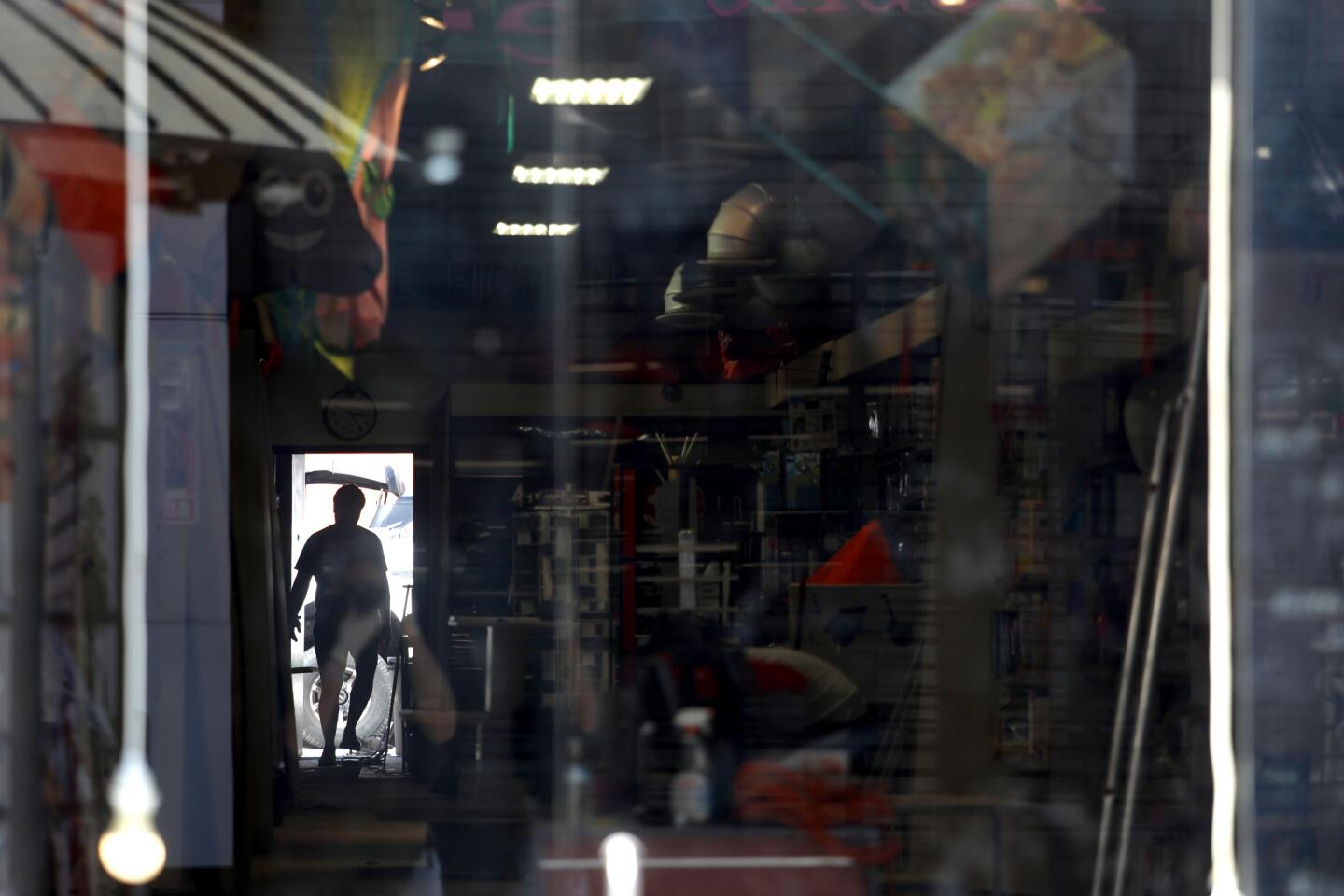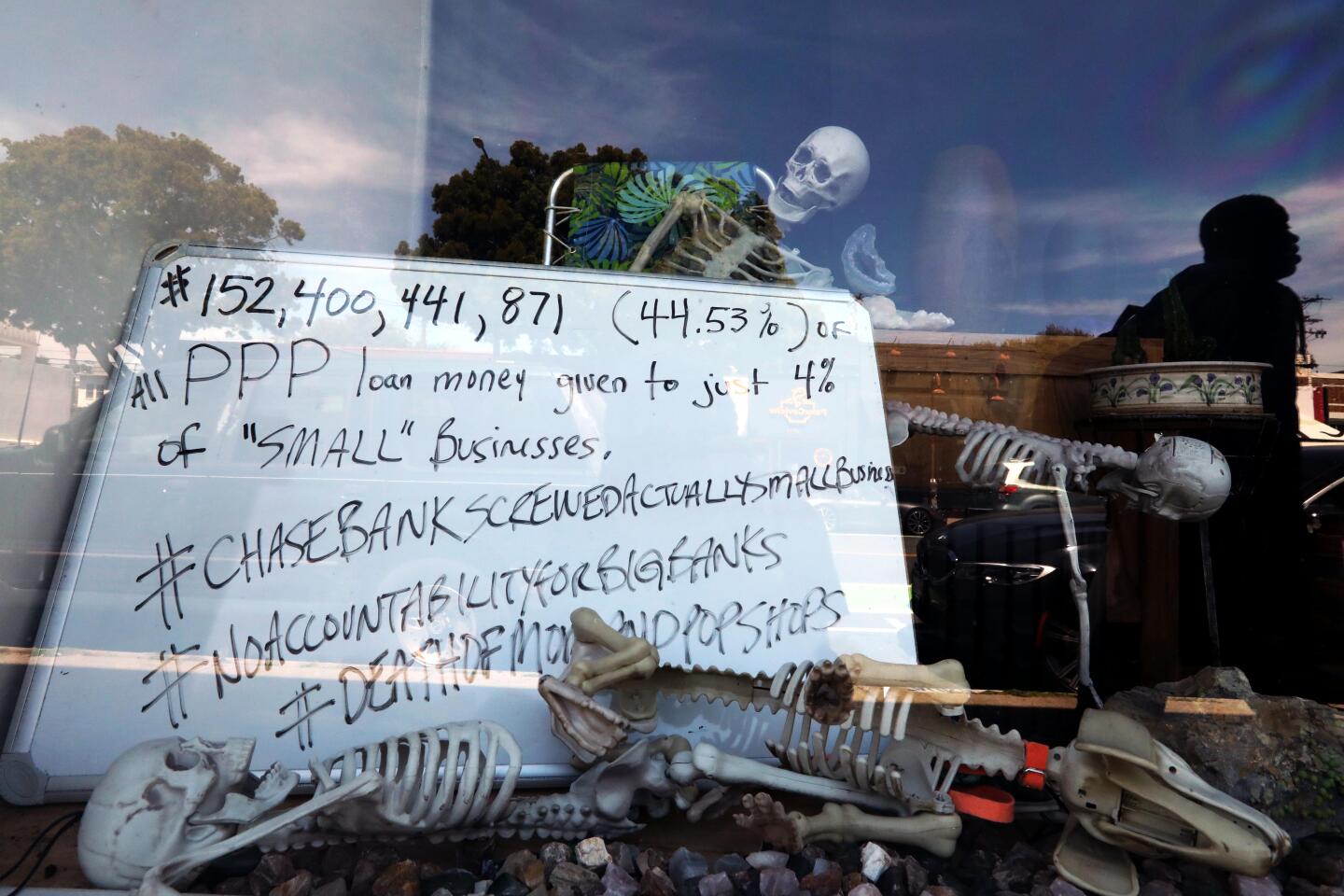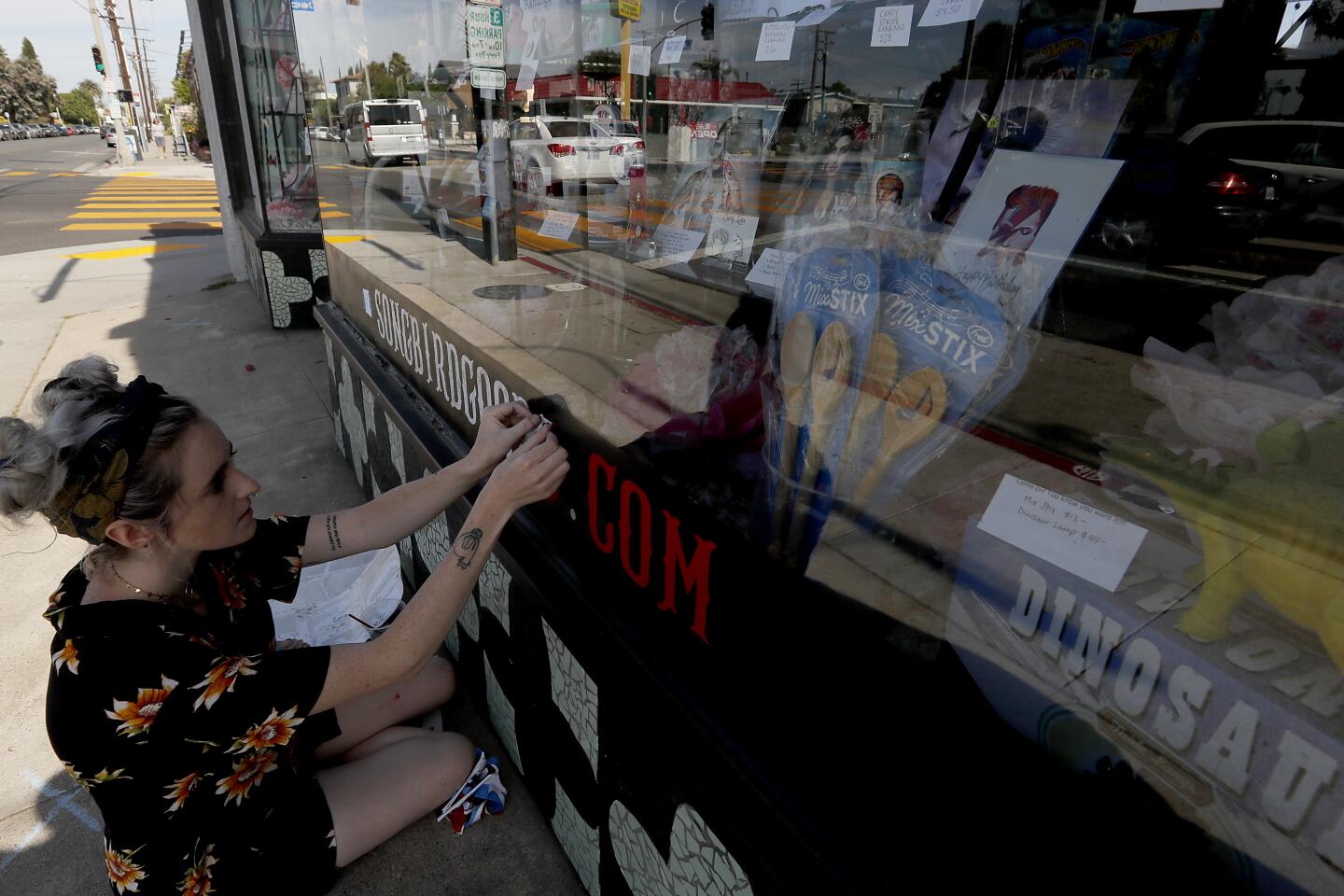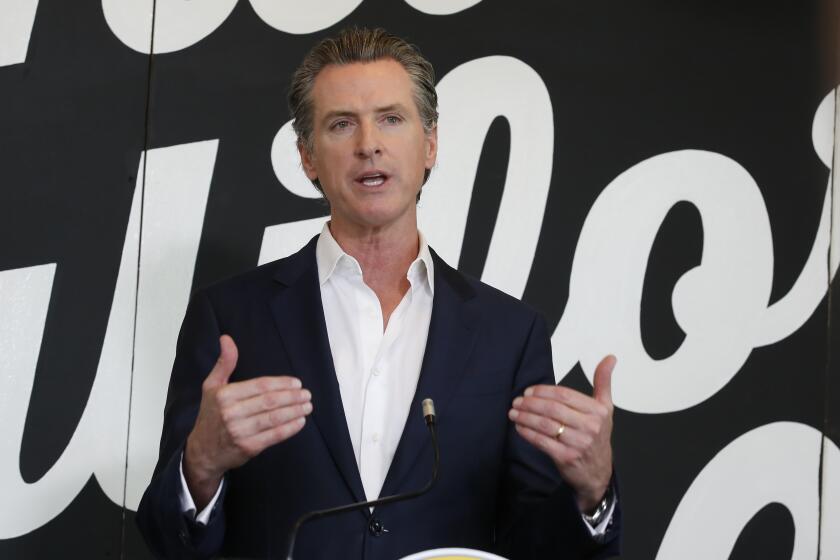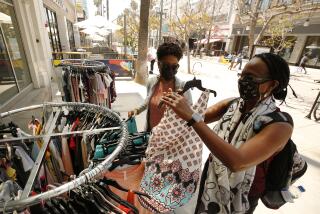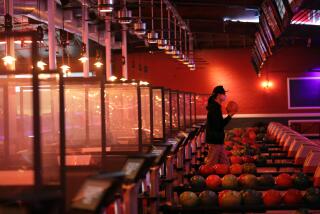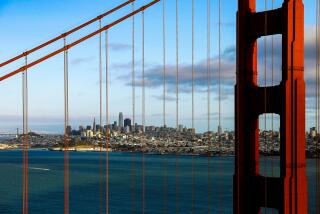California begins reopening economy as select businesses unlock doors
Holly Boies walked down Abbot Kinney Boulevard in Venice, hoping to see stores showing signs of life on the eve of California’s reopening.
But the windows she passed were still covered as she arrived at her concept store, Salt, where she sells women’s clothing, art and children’s books. On Thursday afternoon, she was alone in her store, with the boulevard mostly quiet. Restaurants kept busy with takeout orders, and so did the weed dispensary MedMen, but most small shops like hers remained shuttered.
Friday’s curbside reopening presents a problem for her store, which sells mostly clothing, Boies said. She wondered how people were supposed to buy clothes without coming into the store and trying them on.
“It’s weird,” she said. “I don’t know how we’re going to do it.”
California’s modest reopening of its retail economy is allowing some businesses, like Salt, to offer curbside service beginning Friday while keeping the vast majority of shops closed amid continuing coronavirus concerns.
Newsom’s plan allows bookstores, music stores, toy stores, florists, sporting goods stores, clothing stores and a few others to reopen for curbside pickup only, unless barred by tougher local restrictions. Manufacturers and suppliers that provide goods for those businesses also will be allowed to resume operating.
Boies already had been quietly offering curbside pickup, as have other stores in the area. She had loyal customers who knew the brands she carried and continued buying children’s toys and home decor despite the economic shutdown.
“We’re all doing it already,” she said. “How are we supposed to survive if we only have a website?”
She opened her shop 17 years ago, before Abbot Kinney blew up and GQ magazine called it “the coolest block in America.” She was there before the chain companies started arriving, replacing mom-and-pop stores and spiking rent prices.
Now, Boies is behind on rent and waiting for a small-business loan that, she hopes, will cover it, along with other bills. Her business does not qualify for the paycheck protection program with only one part-time employee, she said.
To survive the forced closure, she launched a website and Instagram page for her store, where she has been posting items every day. But finding the same audience online that she has on Abbot Kinney has proved difficult, and she’s made thousands of dollars less than usual.
“I don’t know how much longer this is going,” she said. “I feel like I’ve done everything I can.”
She arrived at her stores around noon Friday, not particularly optimistic about the curbside reopening. In her display window, she had colorful children’s toys and home decor.
About half an hour after opening for business, no one had come by.
“Nada. Nothing,” she said.
A few minutes later, a trio of bikers riding by paused to take a look at her window. But they only wanted to know how the process of curbside pickup worked, Boies said, and weren’t interested in buying anything.
California allows some retailers to open with curbside service, including bookstores, florists and toy stores. Many parks will reopen Saturday.
The state is recommending that retailers continue to encourage physical distancing and implement “hands-free” ways for customers to pay. Manufacturers should close indoor break areas, and warehouses should carry sanitation materials during deliveries and provide employees with personal protective gear, said Dr. Mark Ghaly, the state’s secretary of Health and Human Services.
“We’re moving forward, but we’re doing it, always, with an eye being led by the data, by the science, by public health,” Gov. Gavin Newsom said during his daily COVID-19 briefing in Sacramento on Thursday.
In Seal Beach on Friday, customers at Devynn’s Garden, a small flower shop, were grateful to be able to pick up bouquets just in time for Mother’s Day. Sunflowers, daisies and succulents were lined up out front. The scent of gardenia hung in the air.
Behind a table near the front entrance, a woman took payment from Scott Hayter, a 34-year-old special education teacher who had come with his 2-year-old daughter, Caroline.
“They’re for mommy,” Hayter told her.
About 10 customers wearing masks stood outside, each trying to keep a distance from one another.
Hayter said he came to the flower shop because it’s his wife’s favorite place. He supported businesses reopening again because people need to work to take care of their families.
“It’s a way for people to pay rent and mortgages,” he said “Last I checked, that wasn’t free,” he said.
Nearby, Christina Dagle, 28, watched her 4-year-old daughter, Eleanor, picking out flowers. She too was happy to see businesses being allowed to reopen.
“It’s a nice thing to see,” she said. “People are respectful on giving each other space.
In Whittier, Katrina Woerner, 37, arrived early Friday to prepare Mother’s Day gift baskets at her family’s bath and body care shop, Pour Le Bain, which was going to be open for two and a half hours Friday afternoon for curbside shopping.
“It’s a great advantage to be able to come down and pick up a personalized gift for your mother rather than just by getting her something off the internet,” Woerner said. “We’re really excited about this opportunity.”
Pour Le Bain had survived primarily on internet and social media orders that were all mailed. Woerner said the bath shop already had a few pickup orders in the queue and expected more activity as customers became aware of the policy.
“This helps,” Woerner said, “at least until we can open up.”
Woerner’s store was one of a few that took advantage of the new curbside service option as many other businesses along what is a normally bustling Greenleaf Avenue in Uptown Whittier remained closed.
A clothing boutique directly across the street from Le Bain chose not to open, instead asking customers on a posted message to continue making purchases through the store’s website.
The Third Street Promenade in Santa Monica was quiet Friday morning, with some runners passing through and people walking their dogs.

Sofia Dillenberger, a UCLA student, waited in front of the Apple store, confused about whether it was included in the soft reopening.
“I don’t really understand what’s going to open today,” the 29-year-old said. “I just hoped it would open.”
She waited for 10 minutes before giving up. She said she thought the Apple store would allow a limited number of people inside but saw only a security guard inside, a locked door and signs that read the company’s retail stores “are closed until further notice.”
The Santa Monica resident said she’s been having problems with her laptop and hoped to come by and have someone in the store fix it so she could finish her online classes. She did not want to send it in for repair because it would take too long.
“I need to get it fixed right away,” she said, disappointed.
Many of the chain retail stores at the Promenade remained closed. At Brandy Melville, piles of clothes were wrapped in plastic and piled onto display tables. The lights were on at the Skechers store, which appeared empty inside and where a shoe in a display case spun in perpetuity.
Ruben Cortez, manager of Lovell’s Records and Tapes in Whittier, was flooded with phone calls this week, both congratulatory and confused.
“Man, I had probably around 20 to 30 calls from people asking me if the store was open or telling me they were happy and they couldn’t wait until tomorrow when they ‘could finally walk inside,’” said Cortez, 36. “I had to tell people that the store wasn’t opening for people to come in, but just allowing for pickups. A lot of people didn’t understand.”
Despite the confusion, the message of curbside pickup was getting through to some patrons. Cortez had five orders confirmed an hour before his shop was set to open.
“It’s great,” Cortez said. “We’ve been fortunate to have good business through social media, mostly Instagram, and now people have been asking for the pickup service.”
While Cortez said he preferred to open for in-store shopping, he credited the community “from La Habra, La Mirada, Montebello, Pico Rivera and Whittier” for rallying to save Lovell’s, which he said has been in its same location since 1965.
Uptown Whittier business owner Kim Wicker wasn’t sure what Friday’s reopening would mean for his store, Monte’s Camera Shop on South Greenleaf Avenue.
The family business, named after Wicker’s father, has hunkered down since mid-March, when Gov. Gavin Newsom implemented a statewide stay-at-home order shuttering all but essential businesses amid the coronavirus pandemic.
His store has survived through some online sales, but he was hoping for an economic reprieve soon.
Wicker, 60, was initially excited to hear about the curbside allowance but didn’t know if his business fit the mold.
“I couldn’t find anything specific from the governor online,” he said. “So I went to the county website and saw a listing for stores that sell clothing, books, toys and sporting goods, along with florists and even golf courses.”
He though his store might fall under the “specialty shop” designation and made calls to county and city officials Thursday, but by the end of the day, Wicker decided to wait until the next stage of reopening.
“We’re probably the kind of business that could open, but I don’t know if we fit the qualifications exactly,” he said. “We were just visited by a county health official last week, and the last thing I want is a fine, so I’m staying closed.”
Newsom said earlier this week that bookstores, florists and others can reopen for curbside pickup Friday, unless barred by tougher local restrictions.
Leaders in Los Angeles and the San Francisco Bay Area have said they plan to take a cautious approach to reopening because the coronavirus remains a significant public health threat in those metropolitan areas.
In L.A. County, select retailers — including those that sell flowers, toys, music, books, clothing and sporting goods — as well as car dealers and other types of bricks-and-mortar businesses will be allowed to open for curbside pickup only starting Friday. In-store shopping will not be permitted.
Under the plan, recreational venues including golf courses and trails will reopen Saturday. Users still must adhere to physical distancing requirements and wear face coverings when they’re in close proximity to others.
Los Angeles County remains the primary COVID-19 hot spot in California, with more than 1,400 deaths and more than 29,000 confirmed cases.
And beginning Monday, anyone traveling through Los Angeles International Airport must wear a mask or face covering, Mayor Eric Garcetti announced.
Officials in San Francisco, which has been more conservative than other California counties, said Thursday that retailers such as bookstores, florists and music stores will be the first shops allowed to operate with curbside pickup beginning May 18.
“We have been hard at work to find ways to reopen more businesses and activities safely and responsibly,” Mayor London Breed said in a statement. “Giving businesses the option to reopen and provide storefront pickup will provide some relief for everyone in our city — allowing some people to get back to work, while still protecting public health. The last thing we want is to see a spike in the number of cases or hospitalizations.”
San Diego County officials announced Thursday that some retail businesses will reopen for curbside service on Friday, including bookstores, jewelry stores, clothing stores, shoe stores, florists, home furnishing stores, antique stores, music stores and sporting goods stores.
Warehouse and manufacturing facilities that support such retail businesses may also reopen Friday.
When it opened last week for the first time since mid-March, Nomads Canteen in San Clemente quickly filled with customers eager to get out of the house and return to some sense of normalcy amid the COVID-19 pandemic.
In some areas that have been less hard hit by the coronavirus pandemic, officials have pleaded with Newsom to allow them to accelerate efforts to lift the stay-at-home restrictions. In San Luis Obispo County, for instance, a bipartisan group of mayors and other political representatives asked Newsom in a letter to allow the county to begin a “science-based, thoughtfully phased reopening of our economy.”
Times staff writer Rong-Gong Lin II and San Diego Union-Tribune writer Lyndsay Winkley contributed to this report.
More to Read
Sign up for Essential California
The most important California stories and recommendations in your inbox every morning.
You may occasionally receive promotional content from the Los Angeles Times.
